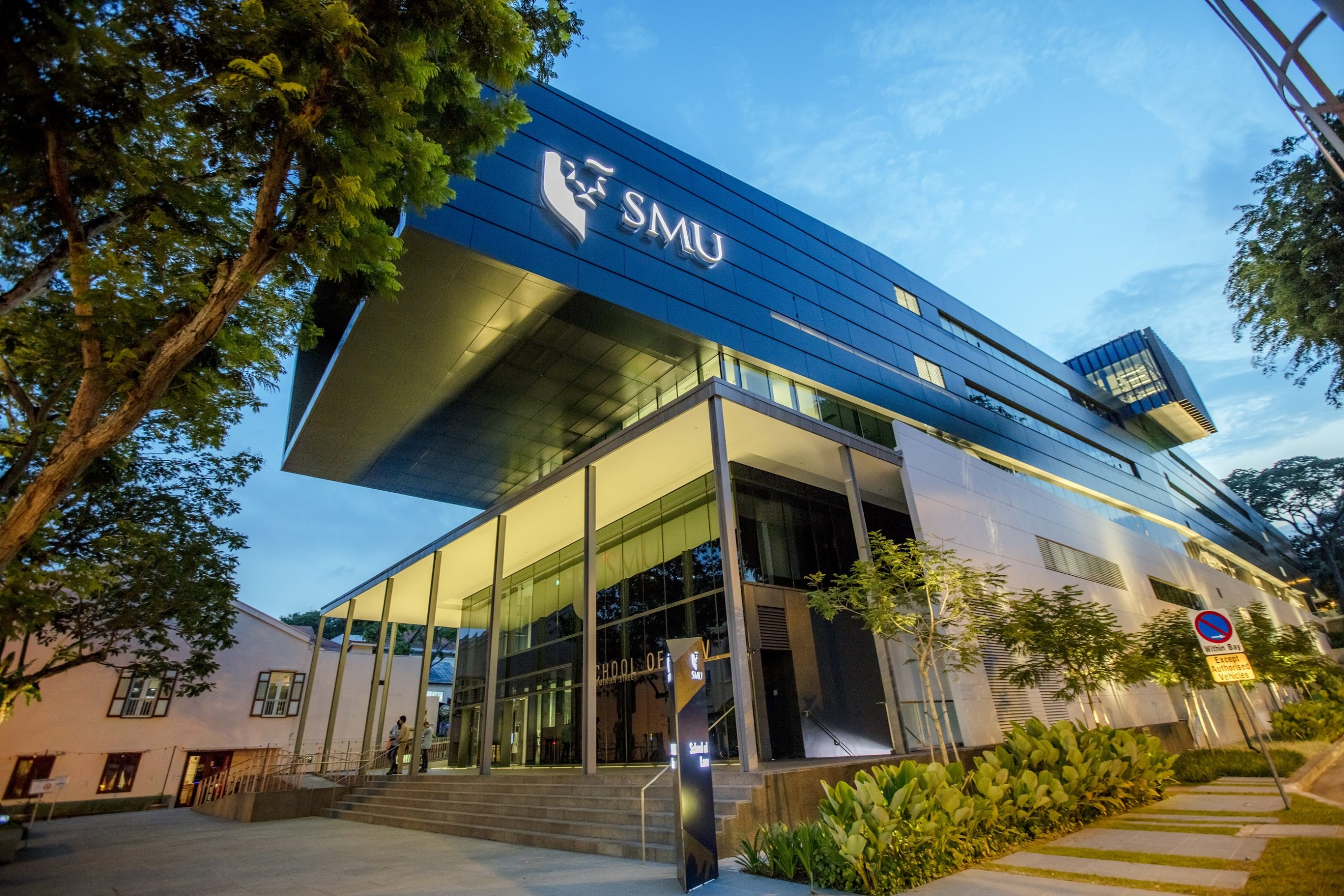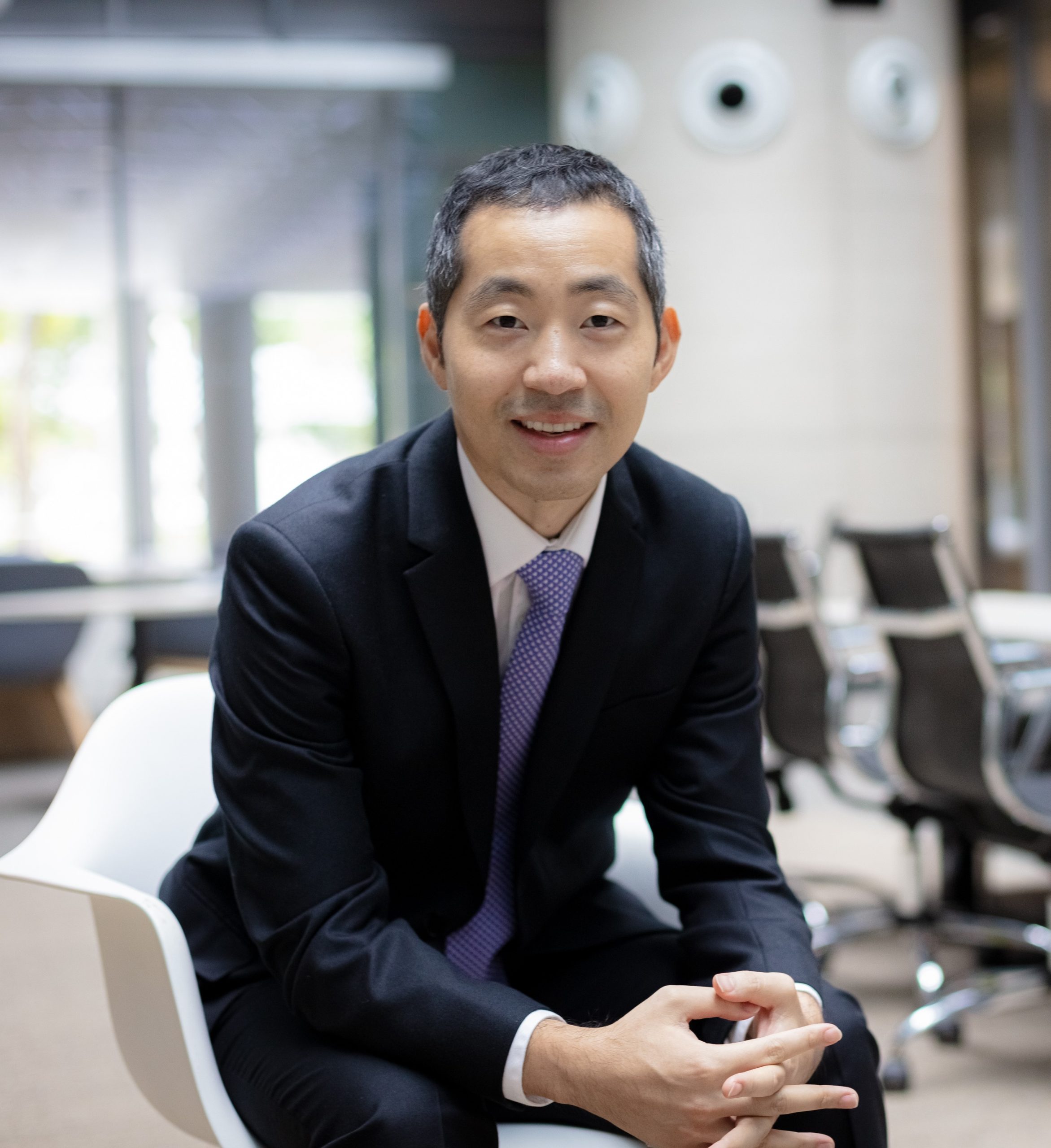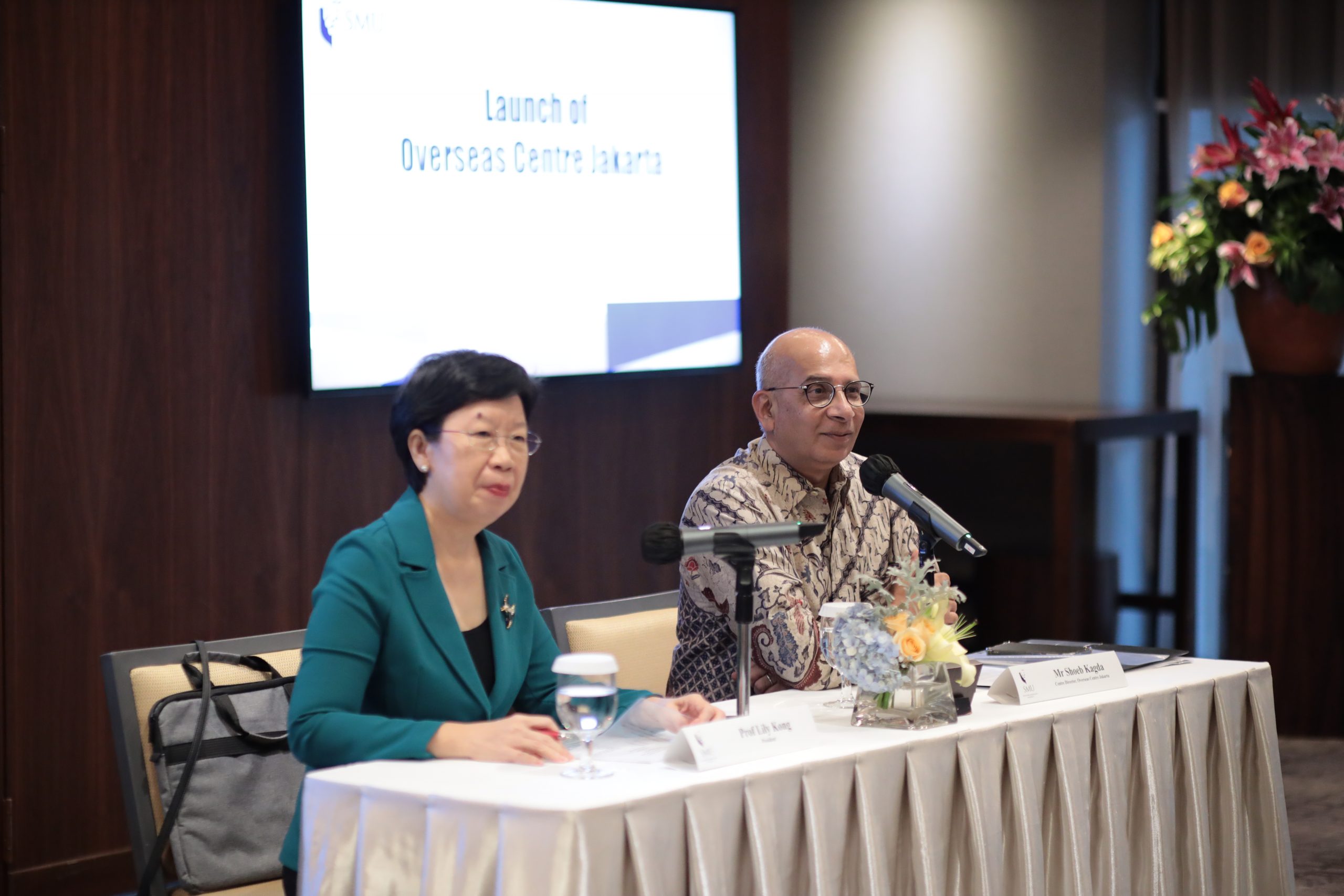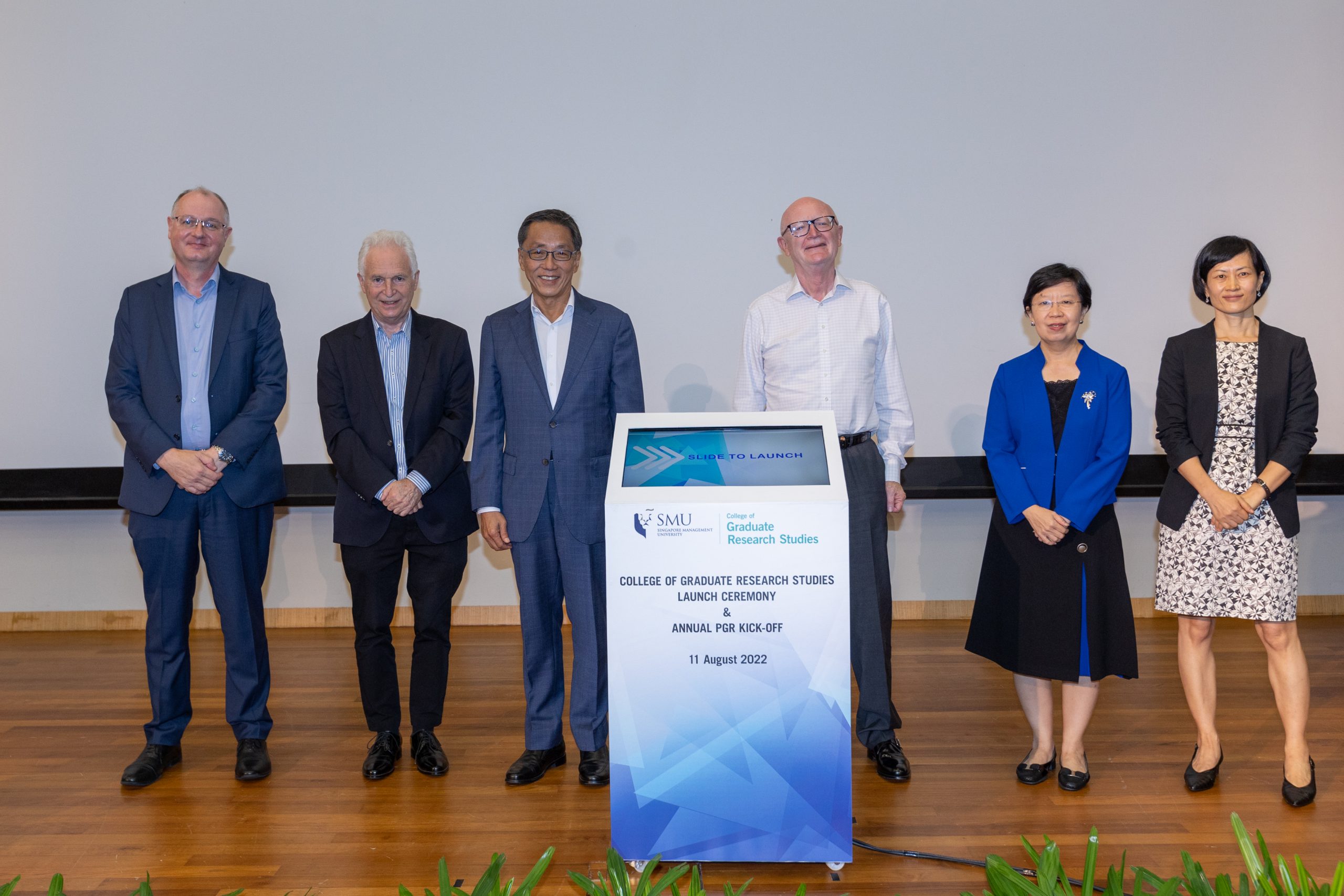SMU College of Graduate Research Studies will build strong intellectual content through credit-bearing interdisciplinary courses focused on advanced methods and interdisciplinary research, and a professional development programme focused on skill-based trainings.
It will enhance ‘co-learning’ experiences and academic exchanges across SMU Schools for postgraduate research students and graduates, facilitate the collaboration of faculty members from different Schools and disciplines, as well as strengthen the development of research which is more applied.
Additionally, it will strengthen networking, cohort building and collaborative opportunities for postgraduate research students across the various programmes, facilitated through the student and alumni groups.
With interdisciplinary training, graduates of the new College will be more well-rounded, more relevant, and better able to provide applied contributions to Singapore’s development needs.
The Singapore Management University (SMU) has established its eighth school – the College of Graduate Research Studies (CGRS). The new College aims to develop world-class thought leaders who are trained to undertake cutting-edge research across disciplines, bringing about significant impact to businesses, societies and public institutions worldwide.
To this end, the College will equip SMU postgraduate research students with knowledge and competencies to develop novel solutions that are relevant to some of today’s most challenging issues through the integration of disciplines, culture and industry. It will enhance integration and interdisciplinarity across the various SMU postgraduate research programmes that will enable our students to gain a holistic learning experience and well-grounded approach to their research. This will be achieved through interdisciplinary programmes, shared courses and professional training workshops. Furthermore, the College will strengthen networking, cohort building and collaborative opportunities for postgraduate research students across the various programmes, facilitated through the student and alumni groups.
Mr Ho Kwon Ping, Chairman, SMU said “The establishment of CGRS is in line with the national strategy of building a robust base of research capabilities and peaks of international excellence, as well as nurturing a strong research and innovation talent pipeline. Our community of learners will benefit from the diversity of expertise, disciplinary and interdisciplinary knowledge and perspectives that will be shared within the College. This enhances the learning experience of postgraduate research students as they become better equipped to understand complex issues and challenges affecting the world across boundaries, and create significant, long-term impact. It will also make them more sought after by academic institutions and industry organisations that have interdisciplinary opportunities. Besides providing a holistic education, the College will also enhance the community-based experience.
“In addition to benefitting our students, the interdisciplinary approach also enables our faculty members to address societal challenges through their thought leadership and research. They increasingly collaborate with colleagues in other Schools, academics in other universities as well as with industry to enhance and accelerate the generation of knowledge.”
Sir Nigel Thrift, Chairman, Academic Affairs Committee, SMU said “The College of Graduate Research Studies is another step towards providing a superlative student experience at SMU, this time for graduate research students. Not only will it establish interdisciplinary programmes and the opportunity to access more interdisciplinary topics and workshops but it will, as a result, allow graduate researchers to gain access to broader research horizons and to discuss these new horizons with many more of their peers.”
Since 2006, SMU has trained over 400 postgraduate research graduates, and is currently training over 580 such students. About 65% of its graduates in academic research PhD programmes are working as faculty members or postdoctoral fellows in prestigious academic universities or institutions in Singapore and internationally, whilst about 35% work on R&D in industries locally and abroad.
Key Elements of CGRS
1. Building strong intellectual interdisciplinary content
(i) CGRS provides postgraduate research students with two categories of courses: Graduate Research Interdisciplinary Topics (GRIT) and Graduate Research Professional Development (GRPD) programme.
GRIT is a series of interdisciplinary courses in curated topics which are either ‘required’ or ‘electives’ depending on the academic research PhD programme. The inaugural interdisciplinary course on ‘Machine Learning for Social Science’ was held in Academic Year (AY) 2021, Term 1. This was followed by the course on ‘Applied Econometrics in Social Science’ in AY2021, Term 2. The course on ‘Introduction to Interdisciplinary Research’ will run in AY2022, Term 1.
GRPD will include two sub-components, comprising Foundation courses (e.g., graduate teaching) and Elective courses (e.g., scientific writing and presentation). This new format, which is credit bearing, will take effect for incoming academic research PhD students from the non-STEM disciplines from AY2022 onwards.
(ii) CGRS will also play an important role in the development of interdisciplinary programmes.
· PhD in Law, Commerce and Technology
CGRS has, together with the Yong Pung How School of Law (YPHSL), launched a new interdisciplinary programme – PhD in Law, Commerce and Technology which will welcome its first students in August 2022.
The first of its kind in Asia-Pacific and among a handful of interdisciplinary research doctoral programmes offered by law schools around the world, the programme is built on YPHSL’s research strengths, particularly in the areas of commercial law, and law and technology.
The programme adopts an industry-focused and policy-oriented approach with the purpose of producing cutting-edge research that can help regulators, companies and society as a whole face the challenges of today’s changing world.
It aims to train future thought leaders in academia, judiciary, regulatory agencies and international organisations, as well as prepare students for a career at leading research-oriented institutions.
· Master’s and PhD programmes in Asian Urbanisms
CGRS has also worked closely with the SMU’s new College of Integrative Studies to launch a Master of Philosophy in Asian Urbanisms and Doctor of Philosophy in Asian Urbanisms, upcoming in AY2023.
The programmes aim to provide an opportunity for Singaporean students, and for students from the Asia region and (eventually) beyond, to access postgraduate-level degrees in urban studies in Singapore that will be theoretically and empirically focused on Asia. With interdisciplinarity at the heart, the programmes integrate courses and supervision from various SMU Schools, especially those with particular urban expertise. Students will develop deep knowledge of the theory and practice in at least one area of urban Asia, and one related area in sustainability, culture or technology. They will also attain the ability to critically analyse problems using either quantitative and/or qualitative research methodologies commonly used in advanced-level scholarly and applied research to address problems of interest to industry partners that can be translated for practical business scenarios.
Professor Wang Heli, Dean of CGRS, said “The launch of the PhD in Law, Commerce and Technology, as well as Master of Philosophy and PhD in Asian Urbanisms, will be our first steps in 2022 and 2023 respectively, to strengthen SMU’s interdisciplinarity in research. The programmes are both academic- and industry-oriented, and our postgraduate research students in these programmes will be expected to bear both intellectual depth and material industrial relevance in their dissertations.”
2. Enhancing ‘co-learning’ experiences and academic exchanges across SMU Schools for postgraduate research students and graduates
CGRS will strengthen the ‘co-learning’ experiences for postgraduate research students via sharing and interdisciplinary learning across Schools through the development and delivery of intellectual content. This intellectual content includes the introduction and facilitation of shared interdisciplinary courses, interdisciplinary programmes (e.g., PhD in Law, Commerce & Technology), as well as interdisciplinary events (like seminars and brown-bag sessions). The College will explore both internal and external resources (e.g., Visiting Fellows) to ensure quality offering of the above-mentioned intellectual content.
3. Strengthening networking, cohort building and collaborative opportunities
The College will ensure that there is enhanced academic and social engagements through the planned Graduate Research Student Society (GRSS). The main objective of the GRSS is to deepen interactions amongst the students through academic events/activities (e.g., brown-bag seminars, poster competitions, and possibly over time an annual Doctoral Conference), and social activities (e.g., get-together or sports sessions). The GRSS will also build strong ties with the planned Graduate Research Alumni Chapter (GRAC), so as to enhance collaborations and source for placements. The GRAC will enhance engagement amongst SMU’s postgraduate research graduates.





 - wow.jpg)



 wow.jpg)


